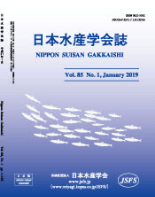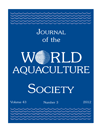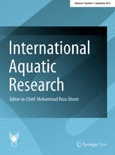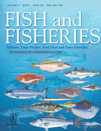
Turkish Journal of Fisheries and Aquatic Sciences
Scope & Guideline
Advancing aquatic knowledge for a sustainable future.
Introduction
Aims and Scopes
- Fish Biology and Genetics:
Research exploring the genetic diversity, stock identification, and reproductive biology of various fish species, including studies on mitochondrial DNA and microsatellite markers. - Aquaculture and Nutrition:
Investigations into dietary effects, nutritional profiles, and alternative feed sources in aquaculture, focusing on improving growth performance and health of cultured species. - Environmental Impact Studies:
Assessments of the effects of pollutants, such as microplastics and heavy metals, on aquatic ecosystems and organisms, highlighting the implications for biodiversity and ecosystem health. - Pathology and Disease Management:
Studies on fish diseases, including viral infections and the effects of various treatments and preventative measures, contributing to better management practices in aquaculture. - Sustainable Fisheries Management:
Research focused on stock assessments, fishery dynamics, and ecological impacts of fishing practices, aimed at promoting sustainable exploitation of aquatic resources. - Innovative Technologies and Methods:
Development and application of novel techniques for aquaculture, such as biofloc systems, probiotics, and genetic engineering, to enhance productivity and sustainability.
Trending and Emerging
- Microplastic Pollution Research:
A significant increase in studies addressing microplastic contamination in aquatic ecosystems represents a growing awareness of environmental issues and their impact on marine life. - Alternative Protein Sources in Aquaculture:
Emerging research focusing on the use of insects and plant-based proteins as sustainable feed alternatives indicates a trend towards innovative and environmentally friendly aquaculture practices. - Climate Change Impacts:
Research examining the effects of climate change on aquatic ecosystems, fish behavior, and physiology is becoming increasingly prevalent, highlighting the urgency of addressing global environmental changes. - Immunology and Disease Resistance:
A notable rise in studies exploring immune responses and disease management strategies in fish indicates a growing interest in enhancing fish health and resilience against pathogens. - Biotechnology Applications in Fisheries:
The application of biotechnological innovations, such as genetic modifications and the development of vaccines, is trending, reflecting advancements in science and technology within the field.
Declining or Waning
- Traditional Aquaculture Techniques:
Research on conventional aquaculture practices appears to be declining as newer, more sustainable methods gain prominence, reflecting an industry shift towards innovation. - Invasive Species Studies:
While previously a popular subject, the frequency of studies focused on invasive aquatic species may be waning as more attention shifts to native species conservation and restoration efforts. - Historical Fishery Data Analysis:
Research relying heavily on historical datasets for fishery management is decreasing, possibly due to the increasing preference for real-time data and adaptive management approaches.
Similar Journals

FISHERIES MANAGEMENT AND ECOLOGY
Innovating solutions for a sustainable aquatic future.Fisheries Management and Ecology, an esteemed journal published by Wiley, serves as a critical platform for researchers, practitioners, and policymakers in the fields of aquatic science and ecology. With an ISSN of 0969-997X and an E-ISSN of 1365-2400, this journal has been at the forefront of advancing knowledge and best practices in sustainable fisheries management since its inception in 1994. Hailing from the United Kingdom, it has steadily distinguished itself with a respectable impact factor and is currently ranked Q2 in both Aquatic Science and Ecology categories, evidencing its scholarly relevance. The journal not only covers a broad spectrum of topics related to fishery ecology and management, but also emphasizes the importance of interdisciplinary approaches to tackle the myriad challenges facing aquatic ecosystems today. It is indexed in reputable databases and boasts commendable Scopus rankings, making it a valuable resource for anyone invested in the sustainable use of aquatic resources. This commitment to accessibility and engagement, although not open access, ensures that critical research remains a cornerstone for ongoing discussions in the field.

Fishes is a premier academic journal dedicated to the exploration and dissemination of cutting-edge research in the fields of aquatic science and ecology. Published by MDPI in Switzerland, this open-access journal has been accessible to researchers globally since its inception in 2016, allowing for the rapid exchange of knowledge that fosters scientific advancement in the study of fish and aquatic ecosystems. With its convergence in the years 2016 to 2024, Fishes proudly holds a notable position in the academic community, evidenced by its category quartile rankings of Q3 in Aquatic Science and Q2 in Ecology for 2023. The journal consistently features innovative research encompassing ecological interactions, conservation strategies, and evolutionary studies within aquatic environments. By integrating interdisciplinary approaches and encouraging contributions from a diverse array of experts, Fishes serves as an invaluable resource for researchers, professionals, and students alike, contributing to the understanding and preservation of our precious aquatic biodiversity.

ACTA ICHTHYOLOGICA ET PISCATORIA
Unveiling the mysteries of fish biology.ACTA ICHTHYOLOGICA ET PISCATORIA is a distinguished peer-reviewed journal dedicated to the field of ichthyology and fisheries science, published by PENSOFT PUBLISHERS since its establishment as an open-access publication in 1970. Based in Poland, this journal serves as an essential platform for researchers, professionals, and students aiming to contribute to the scientific understanding of aquatic life. With an impressive H-index reflecting its growing influence, ACTA ICHTHYOLOGICA ET PISCATORIA is currently ranked in the Q3 quartile within both the Animal Science and Zoology and Aquatic Science categories. According to Scopus, it holds a rank of #227 in Animal Science and Zoology and #147 in Aquatic Science, demonstrating its relevance and contribution to these fields. The journal’s commitment to open access ensures that research findings are widely disseminated, fostering collaboration and knowledge sharing among the scientific community. With a historical scope extending from 1996 to 2024, ACTA ICHTHYOLOGICA ET PISCATORIA remains a vital resource for advancing aquatic research and fostering new insights into the complexities of fish biology and fisheries management.

NIPPON SUISAN GAKKAISHI
Advancing Aquatic Knowledge Since 1932NIPPON SUISAN GAKKAISHI, published by the Japanese Society of Fisheries Science, is a prestigious journal with a long history dating back to its inaugural issue in 1932. This journal, which spans key contributions to the field of Aquatic Science, serves as a vital platform for the dissemination of important research findings related to fisheries and aquatic biology, fostering knowledge and innovation in Japan and beyond. Although it is not an open-access publication, its rigorous peer-review process ensures the quality and integrity of the articles published. The journal is currently listed in the Q4 category for Aquatic Science according to the 2023 metrics, placing it within a niche but significant corner of the research landscape. With an ISSN of 0021-5392 and E-ISSN of 1349-998X, it continues to provide essential insights that benefit researchers, professionals, and students alike, highlighting advancements and challenges within aquatic ecosystems over a converged year span that continues to evolve through to 2024.

Water Biology and Security
Innovating solutions for water resources and ecosystems.Water Biology and Security, published by KEAI PUBLISHING LTD, is a pivotal open-access journal that has been addressing critical issues in the interdisciplinary fields of water sciences, aquatic biology, and environmental sustainability since its inception in 2022. With an E-ISSN of 2772-7351 and a distinguished ranking within the top quartile (Q1) of several categories including Agricultural and Biological Sciences, Animal Science and Zoology, Aquatic Science, and Water Science and Technology, the journal stands out as a leading platform for innovative research. Based in Beijing, China, and supported by an impressive impact factor derived from its Scopus rankings, the journal aims to disseminate high-quality and impactful research that addresses the challenges related to water resources and ecosystems. Its open-access format enhances accessibility, ensuring that vital information reaches policymakers, practitioners, and scholars worldwide. As we converge through 2024, the journal aspires to foster a vibrant scholarly community, facilitating dialogues that inform practice and advance the scientific understanding of aquatic environments.

BULLETIN OF THE EUROPEAN ASSOCIATION OF FISH PATHOLOGISTS
Transforming Insights into Action for Fish Pathologists.BULLETIN OF THE EUROPEAN ASSOCIATION OF FISH PATHOLOGISTS is a leading journal dedicated to advancing research and knowledge in the field of fish pathology, published by the European Association of Fish Pathologists. With its ISSN number 0108-0288, this journal has consistently contributed to the academic landscape since its inception in 1996. Based in the United Kingdom, this journal is recognized for its high-quality research output, holding a commendable Q2 ranking in both Aquatic Science and Small Animals categories as of 2023. The Scopus rankings further reflect its impact, notably securing a 10th rank in Veterinary Small Animals, showcasing its relevance and influence in the field. Although it does not offer Open Access, the content remains vital for researchers and practitioners invested in addressing the challenges associated with fish health and pathogens. The journal serves as a critical platform for sharing innovative studies, fostering collaborations, and informing ongoing developments in aquatic science. Its commitment to maintaining high standards ensures that it remains an essential resource for professionals, researchers, and students alike in pursuit of knowledge on fish pathology and aquatic health.

FISHERY TECHNOLOGY
Exploring cutting-edge methodologies in fishery technology.FISHERY TECHNOLOGY is a distinguished journal dedicated to the advancement of knowledge in the field of fisheries science and technology. Published by the Society of Fisheries Technologists, India, this journal serves as a vital platform for researchers, professionals, and students across the globe to disseminate innovative findings and methodologies related to fishery practices, aquatic ecosystem management, and sustainable fishing technologies. With its ISSN 0015-3001, FISHERY TECHNOLOGY seeks to uphold the standards of scholarly research and contributes significantly to the discourse surrounding marine resources and their sustainable utilization. Although currently not available in an open-access format, the journal remains committed to reaching a wide audience through reputable distribution channels. The journal is characterized by its goal to bridge theoretical research with practical applications, thereby impacting both the scientific community and the fishing industry. Engage with FISHERY TECHNOLOGY to keep abreast of the latest developments and contribute to the sustainable management of aquatic resources.

JOURNAL OF THE WORLD AQUACULTURE SOCIETY
Fostering Collaboration for a Thriving Aquaculture CommunityThe JOURNAL OF THE WORLD AQUACULTURE SOCIETY, published by WILEY, serves as a premier platform for researchers, practitioners, and academics in the thriving fields of aquaculture and aquatic sciences. With an ISSN of 0893-8849 and an E-ISSN of 1749-7345, this esteemed journal boasts an impressive ranking in Scopus, placing it in the Q1 quartile for both Agronomy and Crop Science and Aquatic Science. Recognized for its rigorous peer-review process and high-quality publications since its inception in 1986, the journal continues to play a vital role in disseminating cutting-edge research that addresses the complex challenges and opportunities within aquaculture practices globally. The journal's impact is underscored by its rank of #37 out of 247 within the category of Aquatic Science and #70 out of 406 in Agronomy in 2023, positioning it firmly in the top tier of scholarly journals. Researchers and professionals will find an invaluable resource in this journal, which not only aims to advance scientific knowledge but also fosters a community committed to sustainable aquatic development.

International Aquatic Research
Empowering aquatic scientists to make waves in research.International Aquatic Research, published by the Islamic Azad University, Tonekabon Branch, is a vital open-access journal dedicated to advancing the field of aquatic sciences since its inception in 2009. With an ISSN of 2008-4935 and an E-ISSN of 2008-6970, the journal plays a significant role in disseminating high-quality research findings from Iran and around the globe. It covers a broad range of topics in aquatic biology, fisheries science, and marine ecology, making it a valuable resource for researchers, professionals, and students alike. As of 2023, it ranks in the third quartile (Q3) of the aquatic science category with a Scopus rank of #138 out of 247 in Agricultural and Biological Sciences, reflecting its growing influence in the field. With a commitment to promoting scientific knowledge and fostering collaboration among aquatic research communities, International Aquatic Research is positioned as an essential platform for those dedicated to understanding and conserving marine and freshwater environments.

FISH AND FISHERIES
Fostering stewardship for our oceans and fish populations.FISH AND FISHERIES is a premier academic journal published by Wiley, dedicated to advancing knowledge in the fields of aquatic science, ecology, and oceanography. With an impressive impact reflected in its 2023 categorization in the Q1 quartile across multiple disciplines—including Aquatic Science and Management, Monitoring, Policy and Law—it serves as an essential resource for researchers, professionals, and students alike. This journal includes rigorous, peer-reviewed articles that address the multifaceted aspects of fish biology, conservation, and sustainable fisheries management. The journal's Scopus rankings further validate its significance, with top positions in Earth and Planetary Sciences, and its commitment to fostering scientific dialogue in an era where the oceans and aquatic ecosystems face unprecedented challenges. Despite not being an Open Access journal, FISH AND FISHERIES remains a vital platform for innovative research that informs policy and drives stewardship of fish populations and their habitats.